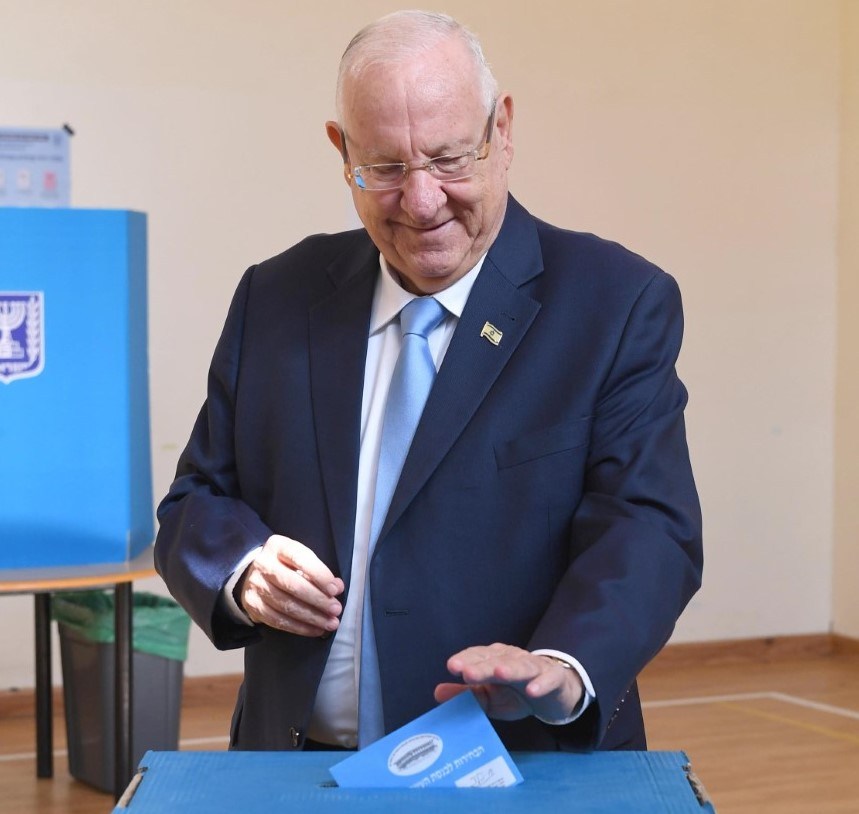With 97 percent of the votes counted yesterday in the parliamentary elections in Israel, no political bloc gained the required 61 seats, out of the 120 seats in the parliament (Knesset), to form a new coalition government. Incumbent Prime Minister Benjamin Netanyahu was weakened and the political landscape became extremely complicated.
The elections took place on Tuesday (17 September) after the previous early elections on 9 April did not result in a new government. In both cases, the elections were called by Netanyahu in an apparent attempt to attain a majority in the parliament to pass a new law that would protect him retroactively from prosecution for corruption allegations.
Election results
The newly formed centre party Blue White under former chief of general staff Benny Gantz emerged as the biggest party with 33 seats against 31 seats for Netanyahu’s Likud party. Unexperienced as politician, Gantz performed better than last time but did not challenge Netanyahu, “Mr Security”, on security issues.
The centre-left bloc, composed of Blue White, the Labour party, the new Democratic Union - and if including the Arab Joint List - became also the biggest bloc with 57 seats, but falling short of being able to form a government.
The Arab Joint List, made up of four Arab-Palestinian parties with different ideologies, campaigned this time under a joint list and regained three seats thanks to a higher voter turnout (60 %) but the result is still below their potential. Whether they will be included, for the first time, in a centre-left government is uncertain but their support would be necessary for such a government to be formed.
The centre-right bloc composed of Likud, two ultra-orthodox parties and a far-right party received 55 seats. Likud lost four seats compared to the previous elections in April but the loss was actually eight seats since the centrist party Kulanu had merged with Likud after the April elections, where it had received 4 seats. An openly racist party did not pass the threshold of 3,25 percent.
The secular-rightist Yisrael Beitenu party increased its number of seats from 5 to 8. This makes its leader Avigdor Lieberman kingmaker in the attempts to form a new government. Last time, he refused to join Netanyahu´s centre-right bloc on the issue of the conscription of ultra-orthodox in the military.
This time, the election denied either bloc from forming a government on its own and could be interpreted as a call from the voters to form a national unity government. If this would happen, it would be an inevitable consequence of the elections.
Actually, the election results reflect a deeply divided and polarized society made worse by incitement by politicians. Demographic changes and ongoing settlement in the West Bank give extremist parties an unproportionable say in forming a coalition government and extracting concessions from the Prime Minister.
Challenges
Blue White campaigned on promises on overthrowing Netanyahu’s rule and save the Israeli democracy. It also committed itself not form a unity government with Likud under Netanyahu who is subject to a judicial process on charges of corruption, fraud and breach of trust.
A delayed hearing on the charges is scheduled to take place on 2 October and is expected to result in an indictment. Until then, no rebellion against Netanyahu is likely to take place in Likud.
Besides Likud, all parties are actually alliances of several political groups and can easily break-up or betray any commitments given to the voters before the elections. Hardly any party presented a political agenda besides of remaining in power or taking power.
Asked by The Brussels Times if EU would try to jumpstart the peace process, in case a new centre-left government would be formed, an EU spokesperson declined to comment. During Netanyahu’s populist government, political relations with EU reached an all-time low. For the EU, the election results might bode a chance for improved relations and a window of opportunity for reviving the peace process.
Other challenges for a new government would be to restore trust in media and ensure the independence of checks and balances institutions such as the Supreme Court of Justice and the State Comptroller’s Office. A new government would also have to consider abolishing the “tyranny of 61” and replace simple majority by qualified majority voting on important legislation and appointments.
What next?
The party with the most mandates and the biggest chances of forming a new government will now be asked by the president, Reuven Rivlin, to form the government. The Israeli president, who normally has a ceremonial function, plays a crucial role after elections and can use his discretion to give the mandate of forming a new government to one of the elected Knesset members.
Rivlin will start consultations with all parties elected on Sunday 22 September. Once he receives the official results of the elections on Wednesday 25 September, he will consider if a further round of consultations is required.
During the consultations, he will ask the representatives of the parties which Knesset member they recommend he should invite to form a government. Following the consultations, within no more than seven days, he must ask a Knesset member who agrees to do so to form a government.
As happened in the last elections for the first time, Rivlin has ordered that the meetings with the parties will be broadcast live on all platforms, to ensure transparency for the citizens. Once the president has entrusted a Knesset member to form a government, that person has 28 days to form a new government. If required, the president can allocate up to 14 additional days.
Rivlin will probably do his utmost to succeed in his task as to avoid new elections. When exercising his own right to vote, he said that “On polling day, I generally wish us all a happy election holiday, but recently, we have been celebrating a little too often.”
M. Apelblat
The Brussels Times

